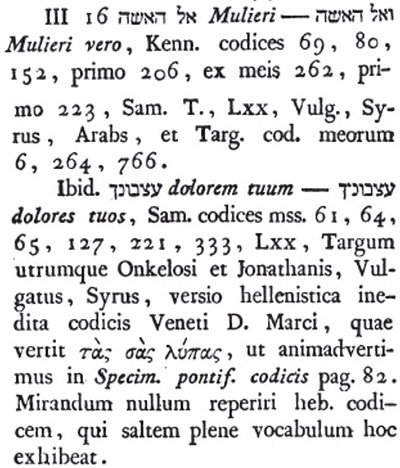ואל האשה אמר הרבה ארבה עצבונך והרנך בעצב תלדי בנים ואל אישך תשוקתך והוא ימשל בך׃
Gen 3:16 [Samaritan]
ואל האשה אמר הרבה ארבה עצבונך והריונך בעצבון תלדי בנים ואל אישך תשוקתך והוא ימשל בך׃
And to the woman He said, “I will greatly multiply your pain and your pregnancy in pain you will bring forth children. And to your husband shall be your desire, and he will rule over you.”
Gen 3:16 [Masoretic]
אֶֽל־הָאִשָּׁה אָמַר הַרְבָּה אַרְבֶּה עִצְּבֹונֵךְ וְהֵֽרֹנֵךְ בְּעֶצֶב תֵּֽלְדִי בָנִים וְאֶל־אִישֵׁךְ תְּשׁוּקָתֵךְ וְהוּא יִמְשָׁל־בָּֽךְ׃
To the woman He said, “I will greatly multiply your pain and your pregnancy in pain you will bring forth children. And to your husband shall be your desire, and he will rule over you.”
Gen 3:16 [Targum Onkelos]
לְאִיתְּתָא אֲמַר אַסְגָּאָה אַסְגֵּי צַעֲרַיְיכִי וְעִידּוּיַיְכִי בִּצְעַר תְּלִידִין בְּנִין וּלְוָת בַּעְלִיךְ תְּהֵי תִּאוּבְתִּיךְ וְהוּא יִשְׁלַט בִּיךְ:
To the woman He said, “I will greatly multiply your pain and your pregnancy in pain you shall bring forth children. And to your husband shall be your desire, he will rule over you.”
Gen 3:16 [Samaritan Targum]
ולאתאה אמר סנו אסגי עצרוניך בטעניך ועל עצרון תילדי בנין וליד גבריך עזרותיך והוא ישלט עליך:
And to the woman He said, “I will greatly multiply your pain and your pregnancy in pain you will bring forth children. And to your husband shall be your desire, and he will rule over you.”
Gen 3:16 [Peshitta]
ܘܠܐܢܬܬܐ ܐܡܼܪ܂ ܡܣܓܝܘ ܐܣܓܐ ܟܐ̈ܒܝܟܝ ܘܒܛܢܝ̈ܟܝ܂ ܘܒܟܐ̈ܒܐ ܬܐܠܕܝܢ ܒܢ̈ܝܐ܂ ܘܥܠ ܒܥܠܟܝ ܬܬܦܢܝܢ܂ ܘܗܼܘ ܢܫܬܠܛ ܒܟܝ܀
And to the woman He said, “I will greatly multiply your pain and your pregnancy and in pain you will bring forth children. And to your husband you shall return to, and he will rule over you.”
* The Syriac has ܘܥܠ ܒܥܠܟܝ ܬܬܦܢܝܢ ‘and you shall turn to (or against) your husband’. The translation of the Hebrew particle אל by על which means more frequently ‘against’, and the change of the letter ק into a ב in the word תשוקתך which in other places is rightly rendered by ‘desire.’ The LXX also has ἀποστροφή (turning back).
Gen 3:16 [Septuagint]
Καὶ τῇ γυναικὶ εἶπεν· Πληθύνων πληθυνῶ τὰς λύπας σου καὶ τὸν στεναγμόν σου· ἐν λύπαις τέξῃ τέκνα, καὶ πρὸς τὸν ἄνδρα σου ἡ ἀποστροφή σου, καὶ αὐτός σου κυριεύσει.
And to the woman He said, “I will greatly multiply your pain and your groaning; in pain you shall bring forth children; and to your husband you are turning back, and he will rule over you.”
* you are turning back or shall be your recourse
Gen 3:16 [Old Latin (Vetus Latina)]
Et mulieri dixit : Multiplicans multiplicabo tristitias tuas, et gemitum tuum : in tristitiis paries filios, et ad virum tuum conversio tua, et ipse tui dominabitur.
And to the woman He said, “I will greatly multiply your sorrows and your pain, in sorrow you shall bring forth children, and you shall turn to your husband, and he shall have dominion over you.”
Gen 3:16 [Vulgate]
Mulieri quoque dixit : Multiplicabo aerumnas tuas, et conceptus tuos : in dolore paries filios, et sub viri potestate eris, et ipse dominabitur tui.
To the woman He also said, “I will multiply your woes, and your conception, in pain you shall bring forth children; and you shall be under your husband’s power, and he will have dominion over you.”
אֶֽל־הָאִשָּׁ֣ה אָמַ֗ר הַרְבָּ֤ה אַרְבֶּה֙ עִצְּבֹונֵ֣ךְ וְהֵֽרֹנֵ֔ךְ בְּעֶ֖צֶב תֵּֽלְדִ֣י בָנִ֑ים וְאֶל־אִישֵׁךְ֙ תְּשׁ֣וּקָתֵ֔ךְ וְה֖וּא יִמְשָׁל־בָּֽךְ׃ ס
To the woman He said, “I will greatly multiply your pain and your conception; in pain you will give birth to children. Your desire will be for your husband, and he will rule over you.”
Morphology
- אֶֽל־הָאִשָּׁ֣ה (ʾel-hāʾiššāh) – Root: אשה (ʾ-š-h); Form: Preposition אֶל + definite article ה + noun, singular feminine; Translation: “To the woman”; Notes: Refers to Eve.
- אָמַ֗ר (ʾāmar) – Root: אמר (ʾ-m-r); Form: Qal perfect, third masculine singular; Translation: “He said”; Notes: Refers to God speaking.
- הַרְבָּ֤ה אַרְבֶּה֙ (harbāh ʾarbeh) – Root: רבה (r-b-h); Form: Hifil infinitive absolute + imperfect, first person singular; Translation: “I will greatly multiply”; Notes: Emphasis through infinitive absolute.
- עִצְּבֹונֵ֣ךְ (ʿiṣṣĕḇōnêḵ) – Root: עצב (ʿ-ṣ-b); Form: Noun, singular masculine + second feminine singular suffix; Translation: “your pain”; Notes: Refers to emotional and physical toil.
- וְהֵֽרֹנֵ֔ךְ (wĕhērōnêḵ) – Root: הָרָה (h-r-h); Form: Noun, singular masculine + second feminine singular suffix; Translation: “your conception”; Notes: Refers to pregnancy.
- בְּעֶ֖צֶב (bĕʿeṣeḇ) – Root: עצב (ʿ-ṣ-b); Form: Preposition בְּ + noun, singular masculine; Translation: “in pain”; Notes: Refers to physical suffering in childbirth.
- תֵּֽלְדִ֣י (tēlēḏî) – Root: ילד (y-l-d); Form: Qal imperfect, second feminine singular; Translation: “you will give birth”; Notes: Refers to bearing children.
- בָנִ֑ים (bānîm) – Root: בן (b-n); Form: Noun, plural masculine; Translation: “children”; Notes: Can refer to sons or descendants.
- וְאֶל־אִישֵׁךְ֙ (wĕʾel-ʾîšêḵ) – Root: איש (ʾ-y-š); Form: Conjunction וְ + preposition אֶל + noun, singular masculine + second feminine singular suffix; Translation: “and to your husband”; Notes: Refers to Eve’s relationship with Adam.
- תְּשׁ֣וּקָתֵ֔ךְ (tĕšūqāṯêḵ) – Root: שוק (š-w-q); Form: Noun, singular feminine + second feminine singular suffix; Translation: “your desire”; Notes: Indicates longing or dependency.
- וְה֖וּא (wĕhūʾ) – Root: Pronoun; Form: Conjunction וְ + independent pronoun, masculine singular; Translation: “and he”; Notes: Refers to the husband.
- יִמְשָׁל־בָּֽךְ (yimšāl-bāḵ) – Root: משל (m-š-l); Form: Qal imperfect, third masculine singular + preposition בְּ + second feminine singular suffix; Translation: “he will rule over you”; Notes: Indicates authority or dominance.
